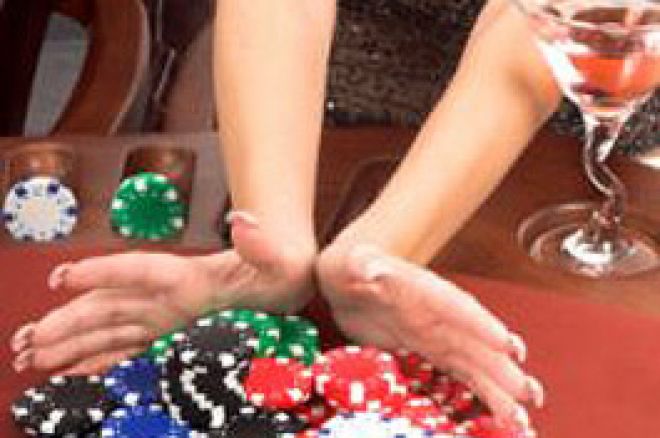Women's Poker Spotlight �C August 30th - Coaching from the Rail

Coaching from the rail has long been a topic many tournament directors face, especially at women's events. I've often wondered why it is such a problem at ladies events until this recently concluded women's event at the Bike. I witnessed several instances of husbands, boyfriends, partners and even family members leaning over to often give their unsolicited advice to a player. Spectators on the rail observing the event often yell foul when they see a player getting help from the rail. But what is legal and what is considered collusion? I went to Jan Fisher of the TDA to get my answers.
Rule #12 of the TDA (Tournament Directors Association) states: No Disclosure - No Advice - One Player to a Hand
Players are obligated to protect the other players in the tournament at all times. Therefore, players, whether in the hand or not, may not:
1. Disclose contents of live or folded hands
2. Advise or criticize play before the action is complete
3. Read a hand that hasn't been tabled
The one-player-to-a-hand rule will be enforced.
Rule #36 of the TDA - Etiquette Violations
Repeated etiquette violations will result in penalties. Examples include unnecessarily touching other players cards or chips, delay of the game, and excessive chatter. Players are required to act
in turn.
Rule #12 is very cut and dried. There is no doubt how and why this rule was written. Anyone speaking to spectators on the rail during a "live" hand would definately be in violation of this long-standing rule of 'One Player to a Hand.' But what if a player was abusing the etiquette rule #36?
The example I am now going to describe happened at a recent ladies event last week. The overwhelming chip leader was jumping up from her chair and running over to her coach and boyfriend for comments and advice on how she just played the hand she was in. Once she described the hand and what she was thinking, the coach was able to relay to her any tells or responses the opponent player showed or said. Needless to say, the player spent less time in her chair than any other player. Several of the players were following her with their eyes to see what she was doing, some whispered to one another motioning in her direction. But none outwardly complained to the floor staff. I found the jumping up and down annoying as did several commenting spectators. After three hours of watching this constant trail blazing I decided to inquire about a violation of rules that possibly could apply to this situation. I was told by floor staff that as long as the coaching didn't occur during a hand it was legal. If a soft warning from the floor staff is all that is needed, then it should happen when first brought to their attention. If the infraction keeps occurring by the same offender then the player should receive a penalty and the spectator should be ejected from the playing area. It is a decision the floor staff must make and enforce.
Another comparison which brings in yet another rule into the picture is how these situations are similar to a text message violation. Obviously, one situation is relaying information through a mechanical device. But isn't it similar to receive the same live information person to person? The element that separates the violation of these rules is communication happening during a live hand verses after the completion of a hand.
TDA directors, Jan Fisher, Linda Johnson, Matt Savage and David Lamb responded to me in direct relation to this example. They agreed that there wasn't a violation of Rule #12, but perhaps an etiquette violation could be imposed if the infraction is overly disturbing to the players. While David Lamb took a strict stand on the etiquette rule, the others viewed the situation as needing a warning. Lamb said "I have never allowed 'coaches' to come to the table with advice or encouragement but the player may step away between hands to discuss whatever. It really is not my business to determine what the private conversation is about even if I suspect that it is all about the game strategy. With that said, if behavior is disruptive, disgusting or just distasteful it is an etiquette violation subject to penalty (once warned to cease and desist). The situation you describe is both disruptive and should be disconcerting for active players at the table. A trip to the rail after each hand should not be allowed. Players sometimes need to be reminded that discussing how to play during those visits does constitute more than one player to a hand."
Given the end of this event, it turns out that the advice given by the coach didn't really 'help'. The chip leader made several pushes, moves and calls that put her out before heads up. Obviously very emotional, she went out of the tournament and over to collect her third-place payout. The obvious roller coaster ride of emotion showed on her face. Overall, the remaining players at the table may have been able to use the state of mind of this player to their advantage. Maybe coaching from the rail isn't such a great idea.








